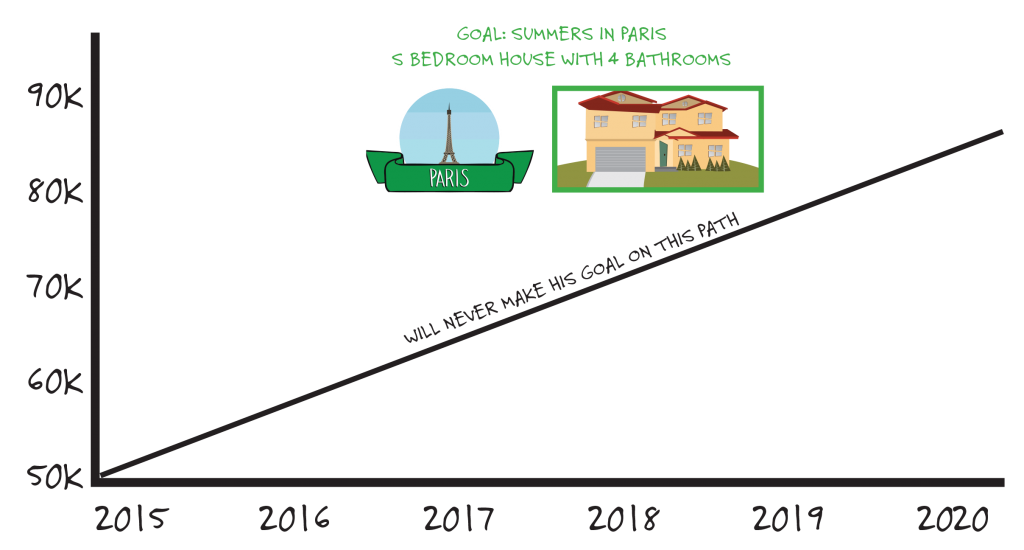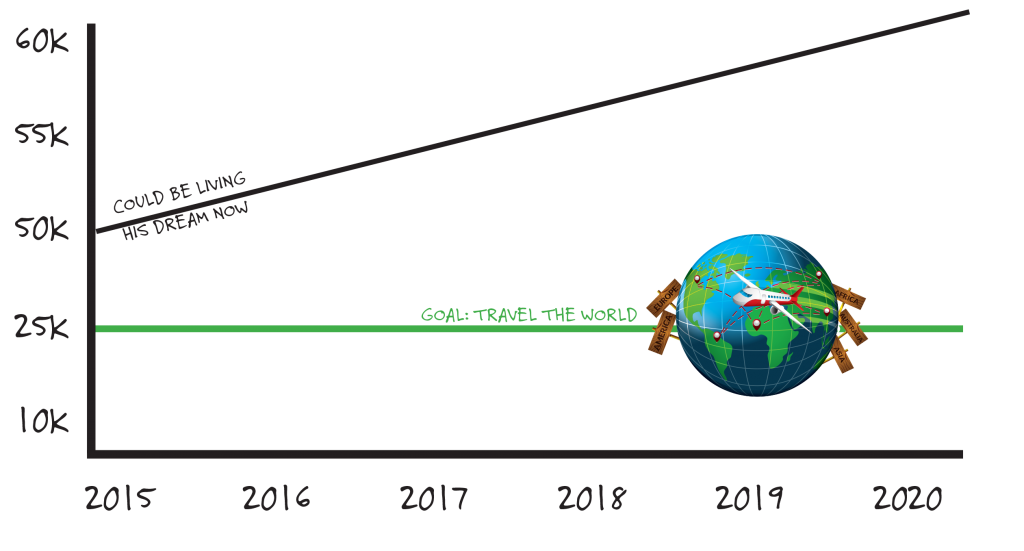What is your current goal?
If you’re like most people, the first thing that comes to mind when that question is posed, is related to money.
Does money buy happiness?
I won’t dive too deep into whether or not money buys happiness in this post, but what I will say is money significantly increases the chances of happiness. It provides more choices, and allows more freedom, both of which have the ability to increase happiness. The issue is when people pursue money without realizing what they’re really after.
I’ve always been interested in making money, but I grew disinterested in the acquisition of more money, just for monies sake. See, gaining more money didn’t affect my life at all- I already did what I wanted, when I wanted. I’d hit the height of diminishing returns. Whether I worked to make an extra $100k, or $1m or whatever the amount, it changed nothing in my life. I already traveled when I wanted, ate what I wanted, spent my days doing whatever I wanted. So, forcing myself to work in an attempt to add more dollars to accounts, did little since there was no real purpose for the money. See, I’d already created the life I wanted, except in a sense I was forcing myself not to live the life I wanted because of the tunnel vision that focused on the acquisition of more.
You’ve heard the popular response to the question, “what’s your number?” …
“More!”.
Well, when people answer in that way, all they’re saying is they do not know themselves. They are using a level one thought process. To someone else with a level one thought process, they sound intriguing. They sound smart. “Wow, that’s what I need to do is keep aiming for “more”. Well, “more” of what? It sure isn’t more clarity, because their answer proves they do not have it.
As Socrates taught us, the most important thing in the world is to, “know thyself.”
So, when someone is asked the question, “how much is enough?” or “what’s your number?”, and they answer, “more”… well, really all they’re doing is showing their own lack of clarity, since in reality the answer should be close to the opposite. “Less” would be a more accurate answer if they really do not possess the clarity that would help them come to an answer.
Blanket statements like “more”, “another million”, or whatever other answer does nothing but fill the air with words that will confuse only others who lack the same clarity you do into thinking you know something they don’t, to be able to respond so confidently with the words you speak. The false confidence you present only delays your own clarity, bringing you further away from the road you need to explore. Any audience you impress will not be a wise one.
So, where am I going with this, and why did I decide to write this post if I’m not going to dive all the way into how money buys happiness?
Well, a lot of people’s misunderstanding of how money affects happiness causes them to do things with their time that decreases happiness. A lack of clarity causes “more money” to be the answer when it comes to goal setting. The flaw with this is when the increased monetary goal does nothing to increase happiness and help you live your dreams. This can happen in two ways:
- the monetary amount is not enough to make any significant changes, changes which would impact happiness levels.
- the monetary amount has hit diminishing returns to a level where your happiness levels are being affected negatively without purpose.
I’d like to break both of these points down so that when you’re goal setting, you can make sure that you aren’t making one of these glaring, but all too common mistakes.
Live your dream
For starters, even beginning goal setting with a monetary amount is a giant flaw. The only way that’d make any sense would be if money itself was the direct cause for happiness. It is not, and thus cannot be the starting point for goal setting. You should be working backwards from what it is you actually want and how you could live your dream, and often in the second part of the process you will decide if a monetary goal will help you achieve those things. It often will. It is at this point I’d like to focus on, to ensure you don’t make the same mistakes most do.
I’ll give examples of how most people think related to these points and why it is flawed thinking, so that you can avoid these traps. This thinking, or lack thereof, is a common cause of unhappiness, so much so that setting no goals at all would have led to more happiness than to setting monetary goals with one of the two common flaws.
Let’s take a look at flaw A:
- the monetary amount is not enough to make any significant changes, changes which would impact happiness levels.
‘Johnny’ is ready to conquer the new year and has decided to set some new goals. He made $50k last year in his job, and has decided he will aim to work extra hours and make $60k this year, which will set him up nicely to receive a good promotion the following year, which will likely lead to $70k pay. What Johnny hasn’t thought about are his actual goals. Remember, a monetary amount is not your actual goal, it’s just what will often help enable your goals to happen.
Johnny, when pressed about why he wants to work extra hours to try and make $60k, answers that it will give him a chance to get a promotion and $70k the next year. This is a common way of thinking, and the way most people respond when pressed about why they are after a certain money goal. ‘If I achieve X, it will set me up to get something even better than X’… and they often incorporate subconscious ego driven incentives with it- praise, admiration, and even envy from others, etc…Very rarely is their actual goal carefully considered and calculated.
When I asked “what would allowing you to make even more than X do?”, Johnny, and most other people cannot accurately answer this question. They are in the money hamster wheel, where they will stay until they learn their actual goals.
Even most entrepreneurs who claim to be free are far from it. They’ve escaped one prison(rat race) for another. The lack of a boss confuses them into thinking they’ve escaped, but they are their own warden, and they don’t know themselves enough to discover the key that would unlock the doors to their freedom. Other than eliminating a boss, they’ve changed nothing. The freelancer who brags about being free, but works endless hours(often more than when they had a job) to be able to tell others they’re ‘living the dream’, either to enable them to sell the dream, or just to mask their own confusion and disappointment, as they secretly know this isn’t the ‘freedom’ they signed up for.
Johnny, like most people, doesn’t know what to say when pressed.
Johnny: “If I work hard to make $60k, I’ll put myself in a position to make $70k the next year”.
Me: “And what will $70k enable you to do”.
Johnny: “I’ll be one of the highest earners in the office”
Me: “And what will being one of the highest earners in the office do for you?”
Crickets. Johnny has no answer. He could make up an answer like most people do. When most people don’t have an answer they usually just fill the air with words to avoid others, or even themselves finding out they have no clarity about what it is they even want. Many people don’t want others to know this. It’s human nature for us to want to feel smart, and most people would rather fill the air with nonsense than to gain clarity, which can only happen from first being honest about the fact they lack that clarity.
Once ‘$50k Johnny‘ opened up about his life and really dug into what he wanted, becoming ‘$60k Johnny‘, or even ‘$70k Johnny‘ didn’t get him there. The carrot that he dangled for himself just kept him a clueless rabbit. It just distracted his mind from realizing that the path he was on wouldn’t get him where he wanted to go.
See, Johnny‘s ultimate goal was to buy his dream house on the lake of his favorite golf course that he’d wanted ever since he was a kid. He’d live there with his wife and future children, teaching his kids to golf, which was a passion of his. He also wanted to be able to take his family on amazing vacations. His wife was a teacher and had always talked about how much she wanted to be able to spend summers in Paris together. Not only had she always wanted to spend time there, she thought it’d be a great life experience for their future children.
Well, finally Johnny realized the flaw in his plan. The path he was on didn’t create an opportunity to achieve their ultimate vision. At the moment Johnny and his wife lived in a small apartment in an average area of town where they were saving up money to feel financially stable enough to have kids. Once Johnny sat down and ran the math on what he’d need to make to give himself and his family the life they aspired to live, he realized he’d never get there. His dream home was a 4,000 square foot, 5 bedroom, 4 bath home that was worth around $800k.
He was noticeably frustrated when he started doing the math. He’d never realize his vision on the path he was on. He’d need to put more than $200k down for the home and pay a monthly payment of around $4k/month to live there. That didn’t include the day to day costs of providing for his family, or the five figure summer vacations in Paris.
His living expenses would only increase once they had children, making it harder and harder to reach their goals. How were they going to reach their goals? Well, they weren’t. Not with the path they were on.
And this is what happens with most people. They set number goals that are supposed to magically lead them to the vision in their head, but they never do the math to see if their current path matches up to allow them to achieve their ultimate goals.
Once Johnny ran the numbers, he realized they’d never be able to financially afford to do the things they wanted to do. It’d take decades to save the amount of money they’d need even if he kept working harder and harder to get continued raises, and by that time their kids would already be grown up, missing the window to realize his wife’s dream of spending summers in Paris with the kids, as well as his own dream of living in his dream lake home on the golf course teaching his kids his favorite sport.
Once he realized this, he knew he had to change the path he was on. If he didn’t line his financial goals up with his actual goals, his goals would never be realized. His success in his career path would lead to guaranteed life failure. He’d just keep chasing a carrot that would lead him to a new carrot, that would lead him to a new carrot, that would only lead him to extreme frustration and unhappiness because he’d be working all that time, and never see his dreams become reality.
Johnny knew he must seek out a different path that would give him the opportunity to realize the dreams his wife and he had. All the current path was doing was keeping him too busy to realize he’d never achieve them.
This new clarity allowed Johnny to make a life change now, rather than waiting until it was too late. On the current path he was on, the chance of goal achievement was close to zero. So, even if Johnny takes what would many would view as a risky decision to leave his current job, it’s the only logical decision if he actually wants to achieve his goals. As you’ve probably learned from reading my post on expected value the riskier decision would be staying on a path that all but guarantees he won’t achieve them. It is irrelevant if his short term income is lower. He must put himself in a situation where his expected value is high enough for goal achievement. Most people let short term income confuse them into choosing paths that won’t lead them to their desired result. Textbook ‘flaw A’.
Let’s look at flaw B.
- the monetary amount has hit diminishing returns to a level where your happiness levels are being affected negatively without purpose.
‘Jake’ works for the same company as Johnny. They’re friends and keep each other accountable for their monetary goals. Like, the popular Jim Rohn quote goes, “you are the average of the 5 people you spend the most time with”. So, it’s not unusual that Johnny and Jake share similar goals. The problem is, up until now their peer group has lacked clarity and blindly set goals without purpose, which is all too common. So, Johnny and Jake have pushed each other to reach similar monetary goals, without even asking each other what their actuals goals are, which should be what sets the monetary goals.
Jake’s ultimate goal is to travel the world while reading and writing. He, like Johnny, has not taken the time to calculate how his monetary goals are affecting his ultimate goals, or he would realize he’s hit a point where he’s already hitting substantial diminishing returns. See, Jake’s a simple guy who would only need $25k/yr to travel the world in the way he wanted, and he already makes $50k, $35k of which he keeps after taxes and loan payments. Much of his work could be set up to be done remotely, which he’d realize if he wasn’t so busy spending his time trying to make more money. Working extra hours in an attempt to make an extra $10k, does nothing but decrease his happiness, since he’s spending more time working, and less time traveling, without a benefit to his goal, which would be a benefit to his happiness.
See, Jake has a similar problem to Johnny in that working harder for a new monetary goal won’t affect his happiness, but for a different reason. Jake has a goal that he could already be living if he wasn’t chasing carrots. He’s confused by the all too common misconception that he must work very hard to some day live his dream life, rather than just living it now.
Ever since he was in high school, he’d envisioned traveling the world, meeting new people, learning new languages, and maybe even turning some of his writings into a book. That was ‘living’ to him. But, instead of living he was too busy working. He’d barely written lately, and the stack of books he’d been meaning to read had started collecting dust since he was so focused on trying to make more money in his job.
I posed a similar question to Jake as I had Johnny: “What will making an extra $10k do for you?”
Jake: “I’ll be able to save more money”
Me: “What will saving more money do for you?”
Jake: I’ll be able to travel the world one day?
Me: Which day will that be, and why is it not today if your income already exceeds the amount that would allow you to live that dream?”
Jake didn’t have an answer. This was the first time he’d thought about it like that. He hadn’t taken the time before to realize that he’d already put himself in a position to live his dream life, he just wasn’t living it. He was spending the time that should have gone towards activities that equated to increased happiness, working for more money. Essentially, going towards lower happiness activities. The extra money he was sacrificing time and happiness for did not serve a purpose. He’d already reached diminishing returns. Working for an extra $10k did nothing other than to control his time. His time going towards chasing carrots, instead of living the life he wanted to live.
Jake had the mindset that many people do: ‘I’m going to work hard and save X amount of money, and then live my ideal life’. Well, the problem is since Jake could already live his ideal life, but wasn’t, he was living suboptimally every day. His happiness was lower than it needed to be, without reason. For Jake his diminishing returns meant decreased current happiness, without increasing future happiness as a result. Textbook ‘flaw B’.
Since both Johnny and Jake’s goal setting up to this point had been logically and mathematically flawed, the numbers they chose weren’t going to have any affect on the life they wanted. Achievement of the number wasn’t a help, but a hinderance to their respective goals.
The monetary goal setting bubble without factoring in actual goals causes tunnel vision monetary goals that create a life of frustration because you don’t realize why you never attain happiness. You don’t attain happiness because you never attain your actual goals(flaw A), or you push off happiness longer than you have to(flaw B). Your failure to attain your actual goals is because your goal setting usually doesn’t even consider them, which sounds insane, but monetary goal setting without an understanding of why and the mathematical calculations that ensure achievement is goal setting that’s laced with insanity, since you’re trading your most valuable asset(time), going after goals you don’t actually want since you assume green paper with a number tied to it will help improve your life. It might, but only if there’s clarity to allow you to know how much green paper you need to attain the life you want, which allows you to attain happiness.
When Johnny and Jake walked into the office Monday morning, they knew what they had to do. Jake asked to start working remotely, and Johnny declined to work the additional hours his boss had offered, so he could spend that time searching for an opportunity that gave him a chance to achieve his goal. To their carrot chasing co-workers it seemed like a crazy decision, but they felt excitement, and at peace with the clarity that they were finally choosing a path that gave them a chance to live to a life that would fulfill them.
There’s a good chance you may be making one of the same mistakes Johnny and Jake were making.
I urge you to re-explore your goals, and to ask yourself if you might be operating under either of the two flaws.
If so, I recommend making a decision that may seem temporarily uncomfortable, and hard for others to understand, but will give you a chance to live the life you actually want, rather than being a professional carrot chaser.
The biggest risk you can take is not pursuing the life you actually want to live.
—
Comment below if you want more articles like this. Make sure you’re subscribed so you get them.






